Policy to Reduce Antisocial Behavior in Goldcare Housing Association
VerifiedAdded on 2023/06/14
|10
|2195
|305
AI Summary
This report discusses policies and strategies to reduce antisocial behavior in Goldcare Housing Association. It includes recommendations such as flexible allocation policies, probationary tenancies, effective communication strategies, working with residents, collaboration with law enforcement agencies, and mediation services.
Contribute Materials
Your contribution can guide someone’s learning journey. Share your
documents today.
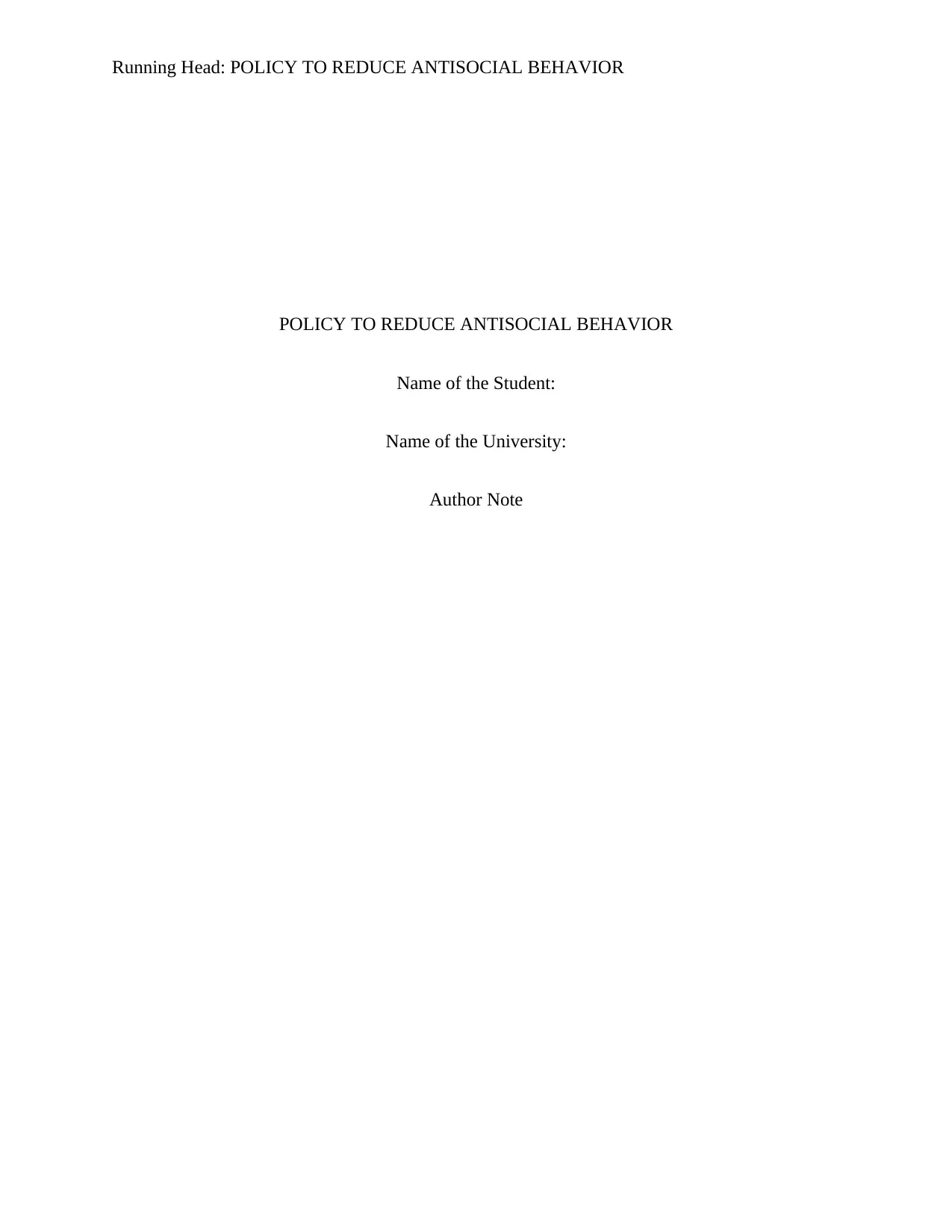
Running Head: POLICY TO REDUCE ANTISOCIAL BEHAVIOR
POLICY TO REDUCE ANTISOCIAL BEHAVIOR
Name of the Student:
Name of the University:
Author Note
POLICY TO REDUCE ANTISOCIAL BEHAVIOR
Name of the Student:
Name of the University:
Author Note
Secure Best Marks with AI Grader
Need help grading? Try our AI Grader for instant feedback on your assignments.
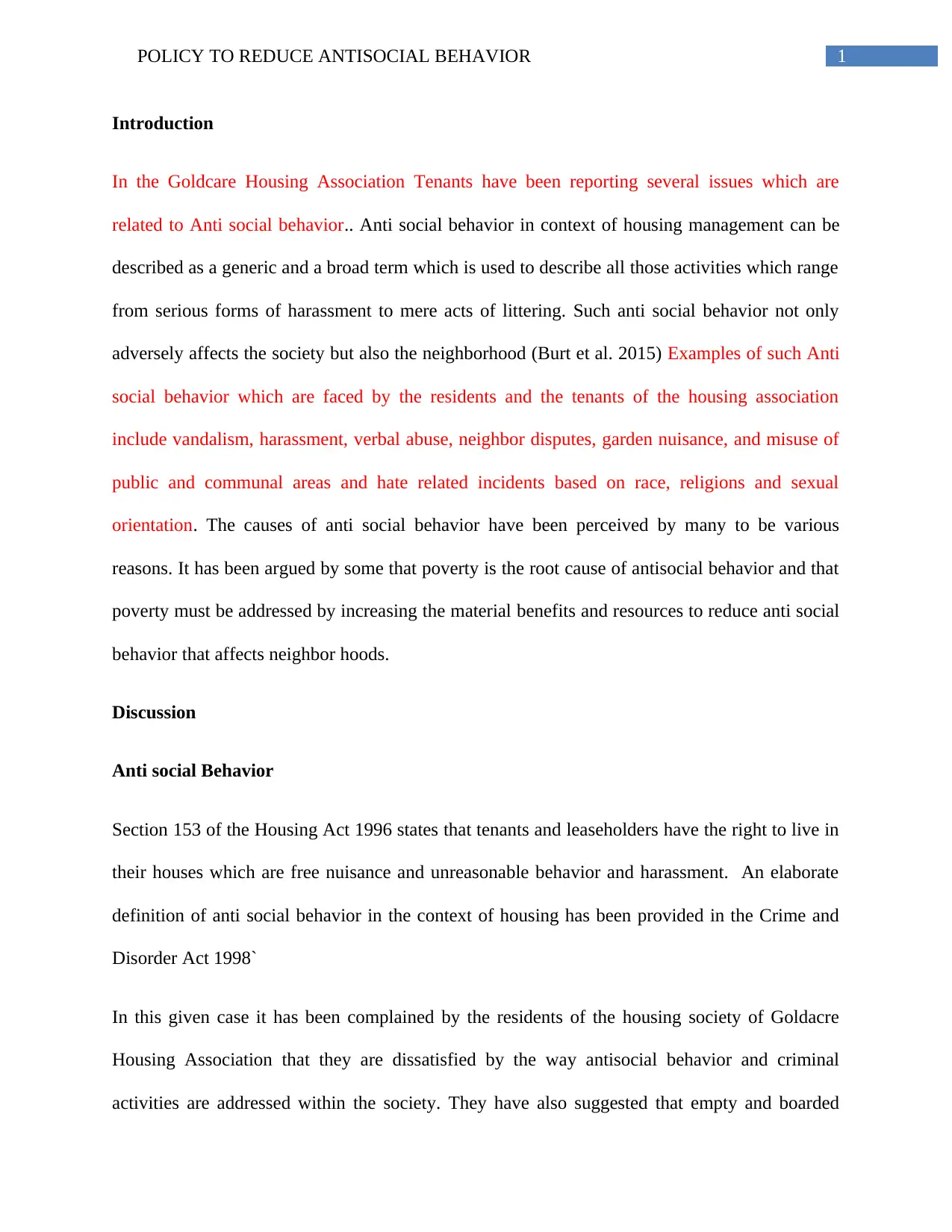
1POLICY TO REDUCE ANTISOCIAL BEHAVIOR
Introduction
In the Goldcare Housing Association Tenants have been reporting several issues which are
related to Anti social behavior.. Anti social behavior in context of housing management can be
described as a generic and a broad term which is used to describe all those activities which range
from serious forms of harassment to mere acts of littering. Such anti social behavior not only
adversely affects the society but also the neighborhood (Burt et al. 2015) Examples of such Anti
social behavior which are faced by the residents and the tenants of the housing association
include vandalism, harassment, verbal abuse, neighbor disputes, garden nuisance, and misuse of
public and communal areas and hate related incidents based on race, religions and sexual
orientation. The causes of anti social behavior have been perceived by many to be various
reasons. It has been argued by some that poverty is the root cause of antisocial behavior and that
poverty must be addressed by increasing the material benefits and resources to reduce anti social
behavior that affects neighbor hoods.
Discussion
Anti social Behavior
Section 153 of the Housing Act 1996 states that tenants and leaseholders have the right to live in
their houses which are free nuisance and unreasonable behavior and harassment. An elaborate
definition of anti social behavior in the context of housing has been provided in the Crime and
Disorder Act 1998`
In this given case it has been complained by the residents of the housing society of Goldacre
Housing Association that they are dissatisfied by the way antisocial behavior and criminal
activities are addressed within the society. They have also suggested that empty and boarded
Introduction
In the Goldcare Housing Association Tenants have been reporting several issues which are
related to Anti social behavior.. Anti social behavior in context of housing management can be
described as a generic and a broad term which is used to describe all those activities which range
from serious forms of harassment to mere acts of littering. Such anti social behavior not only
adversely affects the society but also the neighborhood (Burt et al. 2015) Examples of such Anti
social behavior which are faced by the residents and the tenants of the housing association
include vandalism, harassment, verbal abuse, neighbor disputes, garden nuisance, and misuse of
public and communal areas and hate related incidents based on race, religions and sexual
orientation. The causes of anti social behavior have been perceived by many to be various
reasons. It has been argued by some that poverty is the root cause of antisocial behavior and that
poverty must be addressed by increasing the material benefits and resources to reduce anti social
behavior that affects neighbor hoods.
Discussion
Anti social Behavior
Section 153 of the Housing Act 1996 states that tenants and leaseholders have the right to live in
their houses which are free nuisance and unreasonable behavior and harassment. An elaborate
definition of anti social behavior in the context of housing has been provided in the Crime and
Disorder Act 1998`
In this given case it has been complained by the residents of the housing society of Goldacre
Housing Association that they are dissatisfied by the way antisocial behavior and criminal
activities are addressed within the society. They have also suggested that empty and boarded
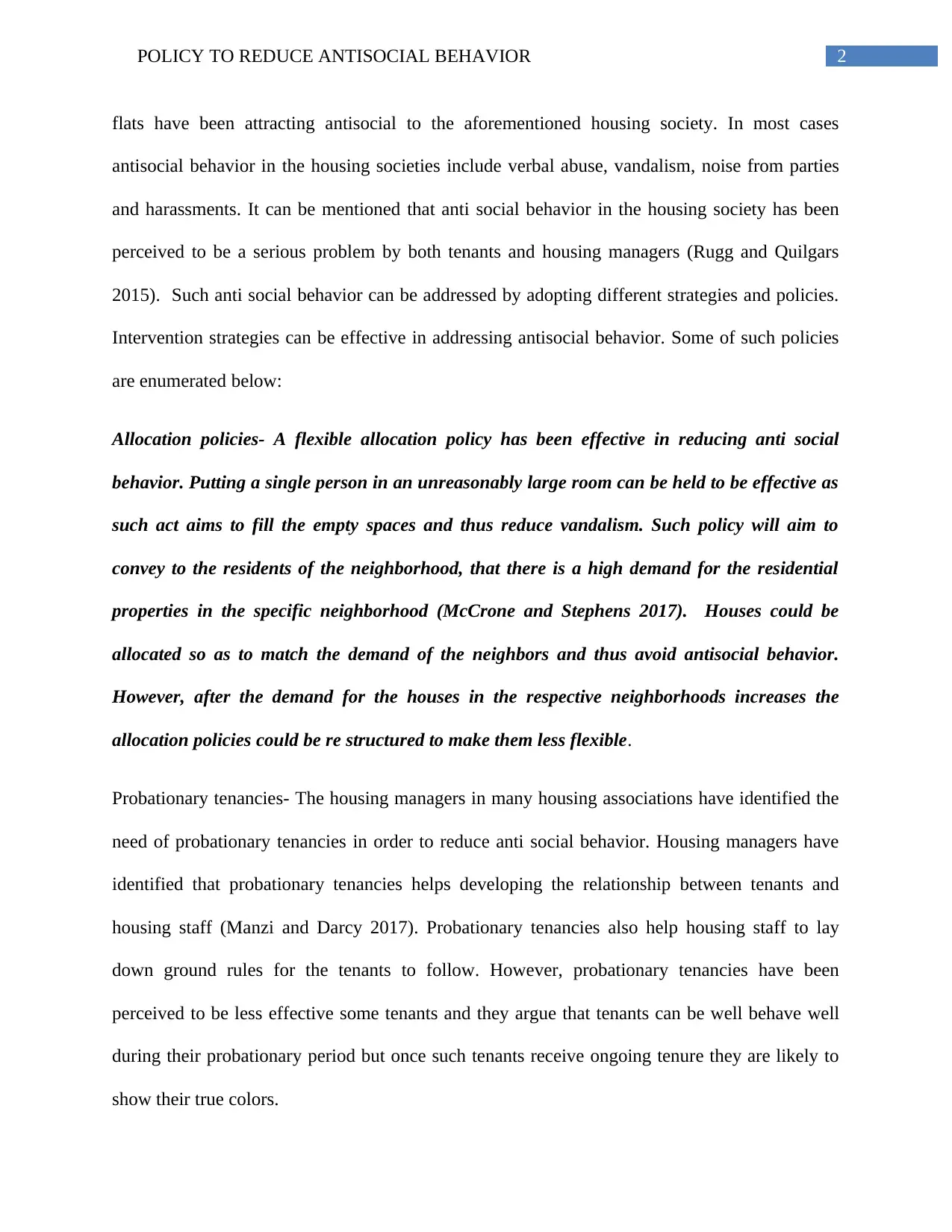
2POLICY TO REDUCE ANTISOCIAL BEHAVIOR
flats have been attracting antisocial to the aforementioned housing society. In most cases
antisocial behavior in the housing societies include verbal abuse, vandalism, noise from parties
and harassments. It can be mentioned that anti social behavior in the housing society has been
perceived to be a serious problem by both tenants and housing managers (Rugg and Quilgars
2015). Such anti social behavior can be addressed by adopting different strategies and policies.
Intervention strategies can be effective in addressing antisocial behavior. Some of such policies
are enumerated below:
Allocation policies- A flexible allocation policy has been effective in reducing anti social
behavior. Putting a single person in an unreasonably large room can be held to be effective as
such act aims to fill the empty spaces and thus reduce vandalism. Such policy will aim to
convey to the residents of the neighborhood, that there is a high demand for the residential
properties in the specific neighborhood (McCrone and Stephens 2017). Houses could be
allocated so as to match the demand of the neighbors and thus avoid antisocial behavior.
However, after the demand for the houses in the respective neighborhoods increases the
allocation policies could be re structured to make them less flexible.
Probationary tenancies- The housing managers in many housing associations have identified the
need of probationary tenancies in order to reduce anti social behavior. Housing managers have
identified that probationary tenancies helps developing the relationship between tenants and
housing staff (Manzi and Darcy 2017). Probationary tenancies also help housing staff to lay
down ground rules for the tenants to follow. However, probationary tenancies have been
perceived to be less effective some tenants and they argue that tenants can be well behave well
during their probationary period but once such tenants receive ongoing tenure they are likely to
show their true colors.
flats have been attracting antisocial to the aforementioned housing society. In most cases
antisocial behavior in the housing societies include verbal abuse, vandalism, noise from parties
and harassments. It can be mentioned that anti social behavior in the housing society has been
perceived to be a serious problem by both tenants and housing managers (Rugg and Quilgars
2015). Such anti social behavior can be addressed by adopting different strategies and policies.
Intervention strategies can be effective in addressing antisocial behavior. Some of such policies
are enumerated below:
Allocation policies- A flexible allocation policy has been effective in reducing anti social
behavior. Putting a single person in an unreasonably large room can be held to be effective as
such act aims to fill the empty spaces and thus reduce vandalism. Such policy will aim to
convey to the residents of the neighborhood, that there is a high demand for the residential
properties in the specific neighborhood (McCrone and Stephens 2017). Houses could be
allocated so as to match the demand of the neighbors and thus avoid antisocial behavior.
However, after the demand for the houses in the respective neighborhoods increases the
allocation policies could be re structured to make them less flexible.
Probationary tenancies- The housing managers in many housing associations have identified the
need of probationary tenancies in order to reduce anti social behavior. Housing managers have
identified that probationary tenancies helps developing the relationship between tenants and
housing staff (Manzi and Darcy 2017). Probationary tenancies also help housing staff to lay
down ground rules for the tenants to follow. However, probationary tenancies have been
perceived to be less effective some tenants and they argue that tenants can be well behave well
during their probationary period but once such tenants receive ongoing tenure they are likely to
show their true colors.
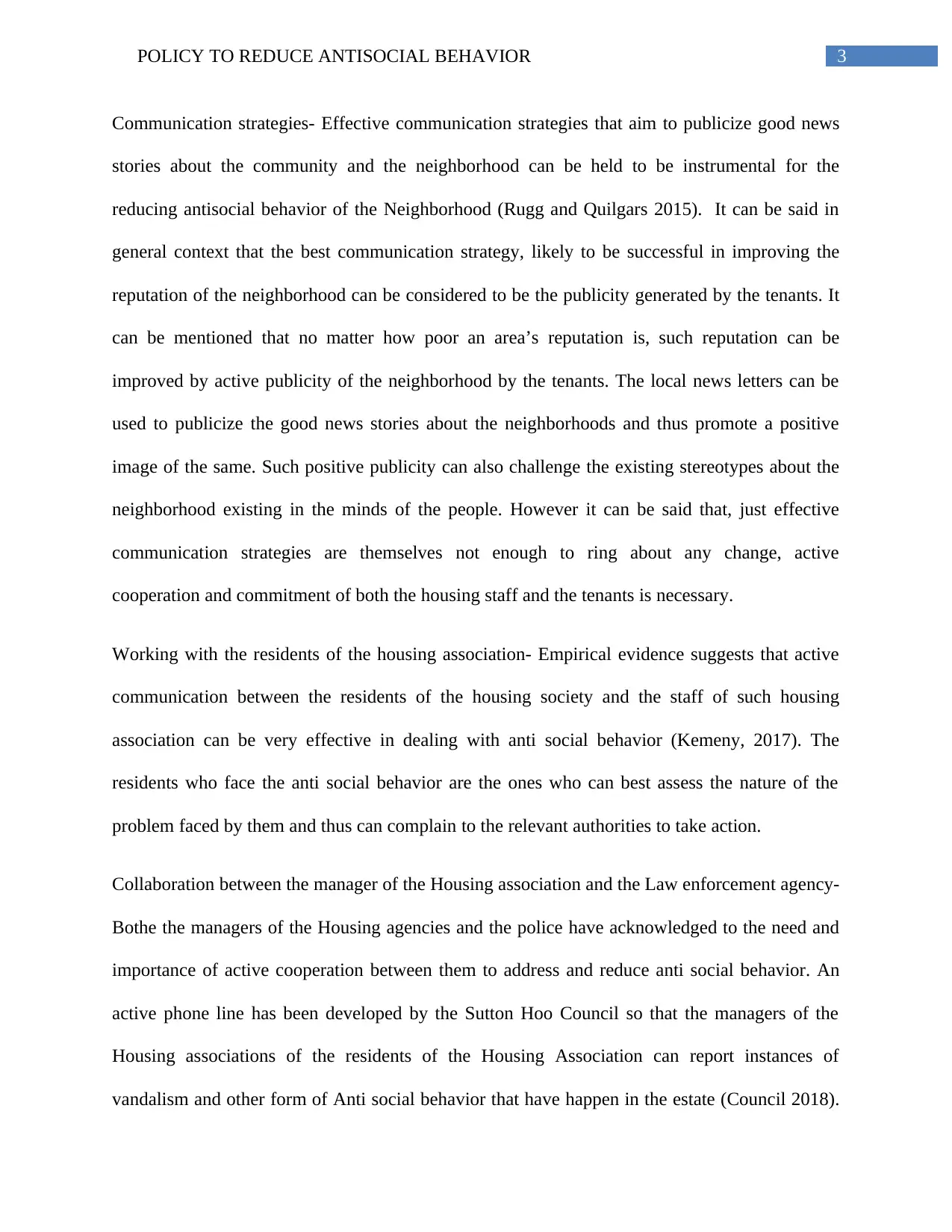
3POLICY TO REDUCE ANTISOCIAL BEHAVIOR
Communication strategies- Effective communication strategies that aim to publicize good news
stories about the community and the neighborhood can be held to be instrumental for the
reducing antisocial behavior of the Neighborhood (Rugg and Quilgars 2015). It can be said in
general context that the best communication strategy, likely to be successful in improving the
reputation of the neighborhood can be considered to be the publicity generated by the tenants. It
can be mentioned that no matter how poor an area’s reputation is, such reputation can be
improved by active publicity of the neighborhood by the tenants. The local news letters can be
used to publicize the good news stories about the neighborhoods and thus promote a positive
image of the same. Such positive publicity can also challenge the existing stereotypes about the
neighborhood existing in the minds of the people. However it can be said that, just effective
communication strategies are themselves not enough to ring about any change, active
cooperation and commitment of both the housing staff and the tenants is necessary.
Working with the residents of the housing association- Empirical evidence suggests that active
communication between the residents of the housing society and the staff of such housing
association can be very effective in dealing with anti social behavior (Kemeny, 2017). The
residents who face the anti social behavior are the ones who can best assess the nature of the
problem faced by them and thus can complain to the relevant authorities to take action.
Collaboration between the manager of the Housing association and the Law enforcement agency-
Bothe the managers of the Housing agencies and the police have acknowledged to the need and
importance of active cooperation between them to address and reduce anti social behavior. An
active phone line has been developed by the Sutton Hoo Council so that the managers of the
Housing associations of the residents of the Housing Association can report instances of
vandalism and other form of Anti social behavior that have happen in the estate (Council 2018).
Communication strategies- Effective communication strategies that aim to publicize good news
stories about the community and the neighborhood can be held to be instrumental for the
reducing antisocial behavior of the Neighborhood (Rugg and Quilgars 2015). It can be said in
general context that the best communication strategy, likely to be successful in improving the
reputation of the neighborhood can be considered to be the publicity generated by the tenants. It
can be mentioned that no matter how poor an area’s reputation is, such reputation can be
improved by active publicity of the neighborhood by the tenants. The local news letters can be
used to publicize the good news stories about the neighborhoods and thus promote a positive
image of the same. Such positive publicity can also challenge the existing stereotypes about the
neighborhood existing in the minds of the people. However it can be said that, just effective
communication strategies are themselves not enough to ring about any change, active
cooperation and commitment of both the housing staff and the tenants is necessary.
Working with the residents of the housing association- Empirical evidence suggests that active
communication between the residents of the housing society and the staff of such housing
association can be very effective in dealing with anti social behavior (Kemeny, 2017). The
residents who face the anti social behavior are the ones who can best assess the nature of the
problem faced by them and thus can complain to the relevant authorities to take action.
Collaboration between the manager of the Housing association and the Law enforcement agency-
Bothe the managers of the Housing agencies and the police have acknowledged to the need and
importance of active cooperation between them to address and reduce anti social behavior. An
active phone line has been developed by the Sutton Hoo Council so that the managers of the
Housing associations of the residents of the Housing Association can report instances of
vandalism and other form of Anti social behavior that have happen in the estate (Council 2018).
Secure Best Marks with AI Grader
Need help grading? Try our AI Grader for instant feedback on your assignments.
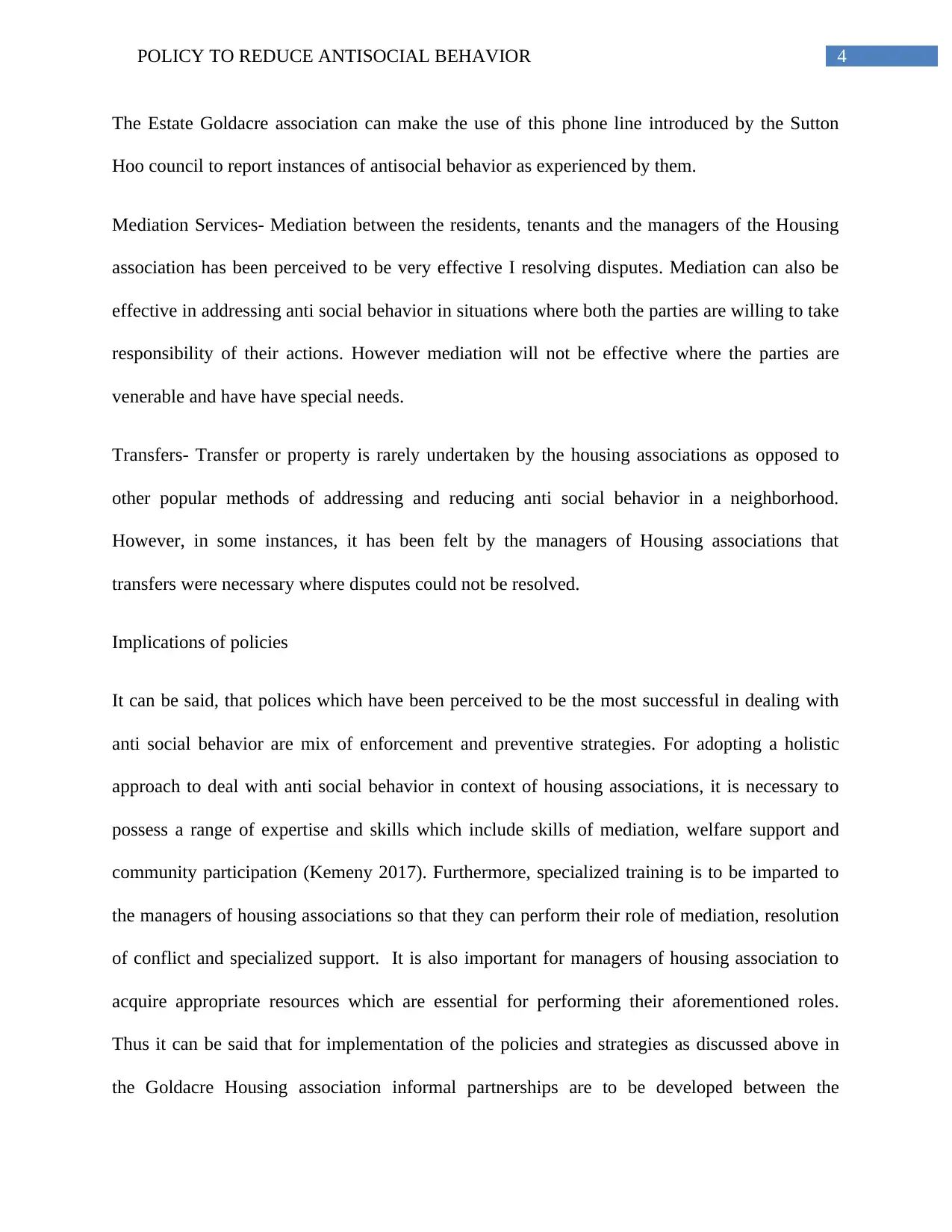
4POLICY TO REDUCE ANTISOCIAL BEHAVIOR
The Estate Goldacre association can make the use of this phone line introduced by the Sutton
Hoo council to report instances of antisocial behavior as experienced by them.
Mediation Services- Mediation between the residents, tenants and the managers of the Housing
association has been perceived to be very effective I resolving disputes. Mediation can also be
effective in addressing anti social behavior in situations where both the parties are willing to take
responsibility of their actions. However mediation will not be effective where the parties are
venerable and have have special needs.
Transfers- Transfer or property is rarely undertaken by the housing associations as opposed to
other popular methods of addressing and reducing anti social behavior in a neighborhood.
However, in some instances, it has been felt by the managers of Housing associations that
transfers were necessary where disputes could not be resolved.
Implications of policies
It can be said, that polices which have been perceived to be the most successful in dealing with
anti social behavior are mix of enforcement and preventive strategies. For adopting a holistic
approach to deal with anti social behavior in context of housing associations, it is necessary to
possess a range of expertise and skills which include skills of mediation, welfare support and
community participation (Kemeny 2017). Furthermore, specialized training is to be imparted to
the managers of housing associations so that they can perform their role of mediation, resolution
of conflict and specialized support. It is also important for managers of housing association to
acquire appropriate resources which are essential for performing their aforementioned roles.
Thus it can be said that for implementation of the policies and strategies as discussed above in
the Goldacre Housing association informal partnerships are to be developed between the
The Estate Goldacre association can make the use of this phone line introduced by the Sutton
Hoo council to report instances of antisocial behavior as experienced by them.
Mediation Services- Mediation between the residents, tenants and the managers of the Housing
association has been perceived to be very effective I resolving disputes. Mediation can also be
effective in addressing anti social behavior in situations where both the parties are willing to take
responsibility of their actions. However mediation will not be effective where the parties are
venerable and have have special needs.
Transfers- Transfer or property is rarely undertaken by the housing associations as opposed to
other popular methods of addressing and reducing anti social behavior in a neighborhood.
However, in some instances, it has been felt by the managers of Housing associations that
transfers were necessary where disputes could not be resolved.
Implications of policies
It can be said, that polices which have been perceived to be the most successful in dealing with
anti social behavior are mix of enforcement and preventive strategies. For adopting a holistic
approach to deal with anti social behavior in context of housing associations, it is necessary to
possess a range of expertise and skills which include skills of mediation, welfare support and
community participation (Kemeny 2017). Furthermore, specialized training is to be imparted to
the managers of housing associations so that they can perform their role of mediation, resolution
of conflict and specialized support. It is also important for managers of housing association to
acquire appropriate resources which are essential for performing their aforementioned roles.
Thus it can be said that for implementation of the policies and strategies as discussed above in
the Goldacre Housing association informal partnerships are to be developed between the
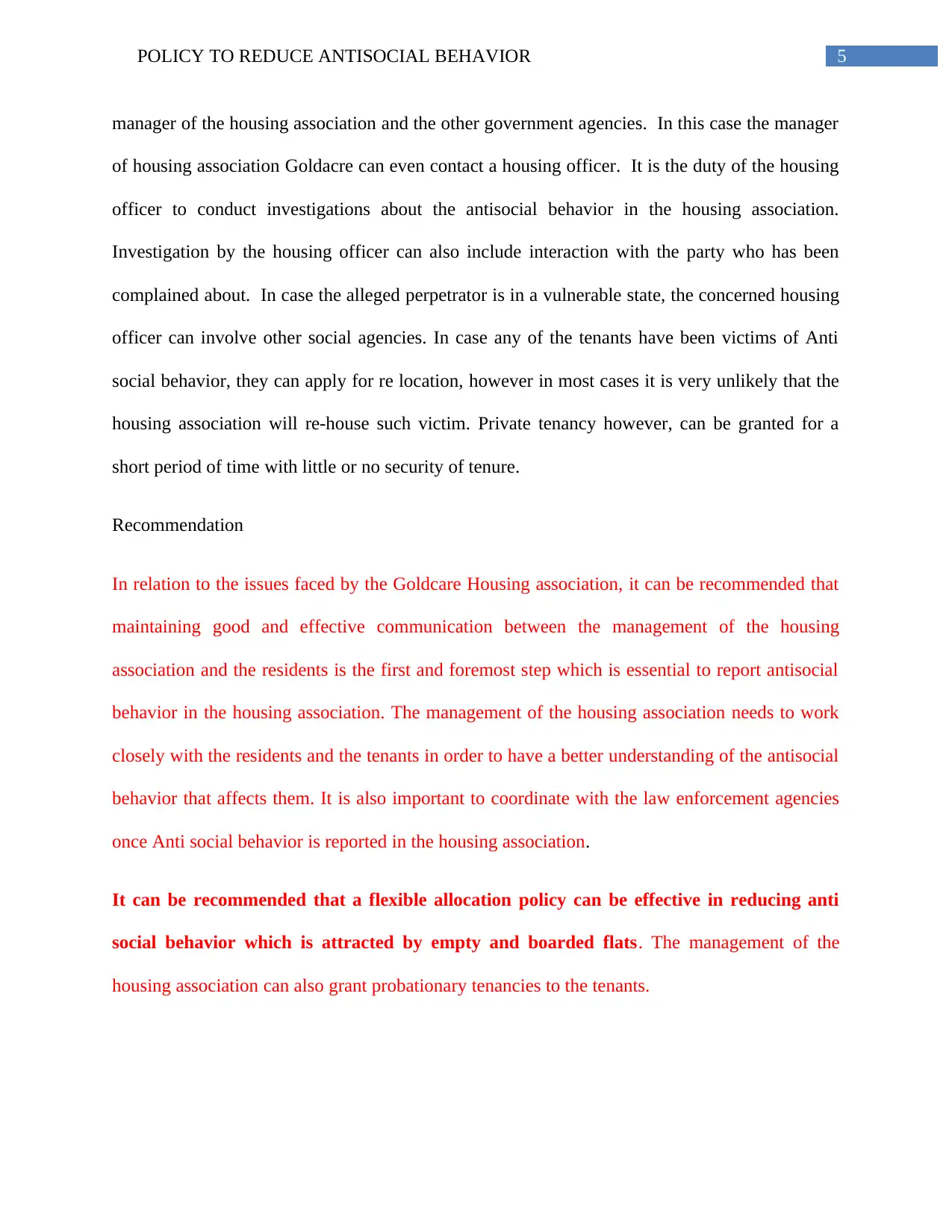
5POLICY TO REDUCE ANTISOCIAL BEHAVIOR
manager of the housing association and the other government agencies. In this case the manager
of housing association Goldacre can even contact a housing officer. It is the duty of the housing
officer to conduct investigations about the antisocial behavior in the housing association.
Investigation by the housing officer can also include interaction with the party who has been
complained about. In case the alleged perpetrator is in a vulnerable state, the concerned housing
officer can involve other social agencies. In case any of the tenants have been victims of Anti
social behavior, they can apply for re location, however in most cases it is very unlikely that the
housing association will re-house such victim. Private tenancy however, can be granted for a
short period of time with little or no security of tenure.
Recommendation
In relation to the issues faced by the Goldcare Housing association, it can be recommended that
maintaining good and effective communication between the management of the housing
association and the residents is the first and foremost step which is essential to report antisocial
behavior in the housing association. The management of the housing association needs to work
closely with the residents and the tenants in order to have a better understanding of the antisocial
behavior that affects them. It is also important to coordinate with the law enforcement agencies
once Anti social behavior is reported in the housing association.
It can be recommended that a flexible allocation policy can be effective in reducing anti
social behavior which is attracted by empty and boarded flats. The management of the
housing association can also grant probationary tenancies to the tenants.
manager of the housing association and the other government agencies. In this case the manager
of housing association Goldacre can even contact a housing officer. It is the duty of the housing
officer to conduct investigations about the antisocial behavior in the housing association.
Investigation by the housing officer can also include interaction with the party who has been
complained about. In case the alleged perpetrator is in a vulnerable state, the concerned housing
officer can involve other social agencies. In case any of the tenants have been victims of Anti
social behavior, they can apply for re location, however in most cases it is very unlikely that the
housing association will re-house such victim. Private tenancy however, can be granted for a
short period of time with little or no security of tenure.
Recommendation
In relation to the issues faced by the Goldcare Housing association, it can be recommended that
maintaining good and effective communication between the management of the housing
association and the residents is the first and foremost step which is essential to report antisocial
behavior in the housing association. The management of the housing association needs to work
closely with the residents and the tenants in order to have a better understanding of the antisocial
behavior that affects them. It is also important to coordinate with the law enforcement agencies
once Anti social behavior is reported in the housing association.
It can be recommended that a flexible allocation policy can be effective in reducing anti
social behavior which is attracted by empty and boarded flats. The management of the
housing association can also grant probationary tenancies to the tenants.
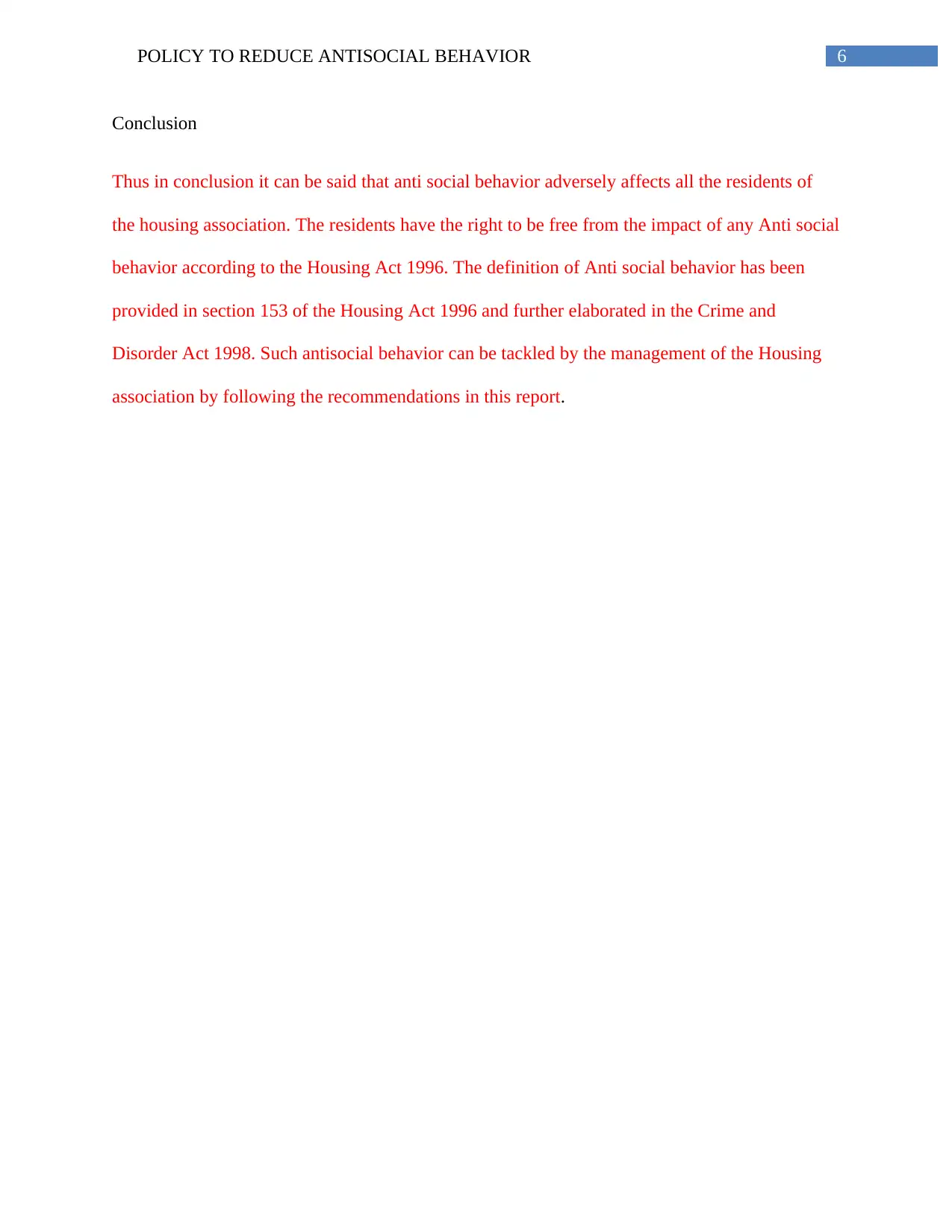
6POLICY TO REDUCE ANTISOCIAL BEHAVIOR
Conclusion
Thus in conclusion it can be said that anti social behavior adversely affects all the residents of
the housing association. The residents have the right to be free from the impact of any Anti social
behavior according to the Housing Act 1996. The definition of Anti social behavior has been
provided in section 153 of the Housing Act 1996 and further elaborated in the Crime and
Disorder Act 1998. Such antisocial behavior can be tackled by the management of the Housing
association by following the recommendations in this report.
Conclusion
Thus in conclusion it can be said that anti social behavior adversely affects all the residents of
the housing association. The residents have the right to be free from the impact of any Anti social
behavior according to the Housing Act 1996. The definition of Anti social behavior has been
provided in section 153 of the Housing Act 1996 and further elaborated in the Crime and
Disorder Act 1998. Such antisocial behavior can be tackled by the management of the Housing
association by following the recommendations in this report.
Paraphrase This Document
Need a fresh take? Get an instant paraphrase of this document with our AI Paraphraser
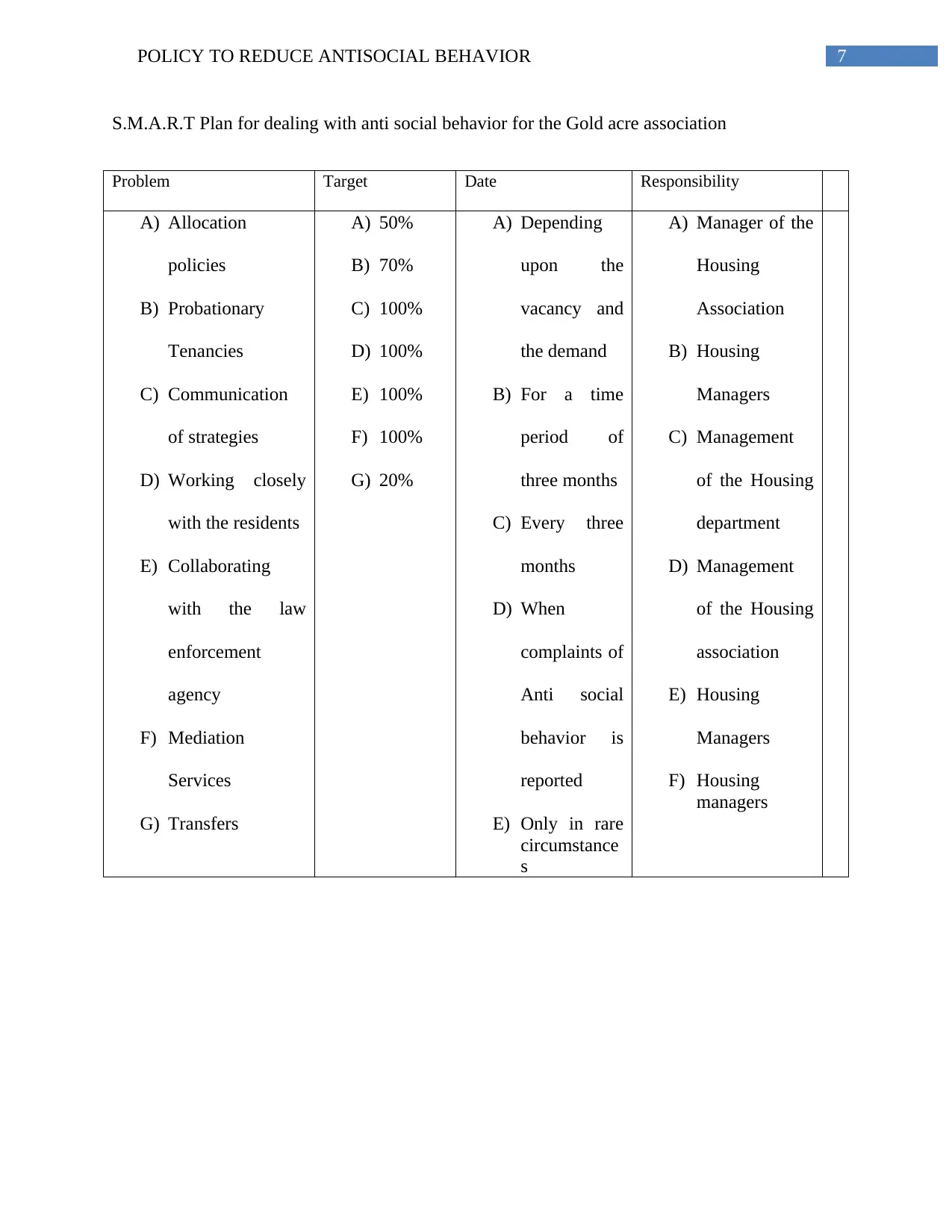
7POLICY TO REDUCE ANTISOCIAL BEHAVIOR
S.M.A.R.T Plan for dealing with anti social behavior for the Gold acre association
Problem Target Date Responsibility
A) Allocation
policies
B) Probationary
Tenancies
C) Communication
of strategies
D) Working closely
with the residents
E) Collaborating
with the law
enforcement
agency
F) Mediation
Services
G) Transfers
A) 50%
B) 70%
C) 100%
D) 100%
E) 100%
F) 100%
G) 20%
A) Depending
upon the
vacancy and
the demand
B) For a time
period of
three months
C) Every three
months
D) When
complaints of
Anti social
behavior is
reported
E) Only in rare
circumstance
s
A) Manager of the
Housing
Association
B) Housing
Managers
C) Management
of the Housing
department
D) Management
of the Housing
association
E) Housing
Managers
F) Housing
managers
S.M.A.R.T Plan for dealing with anti social behavior for the Gold acre association
Problem Target Date Responsibility
A) Allocation
policies
B) Probationary
Tenancies
C) Communication
of strategies
D) Working closely
with the residents
E) Collaborating
with the law
enforcement
agency
F) Mediation
Services
G) Transfers
A) 50%
B) 70%
C) 100%
D) 100%
E) 100%
F) 100%
G) 20%
A) Depending
upon the
vacancy and
the demand
B) For a time
period of
three months
C) Every three
months
D) When
complaints of
Anti social
behavior is
reported
E) Only in rare
circumstance
s
A) Manager of the
Housing
Association
B) Housing
Managers
C) Management
of the Housing
department
D) Management
of the Housing
association
E) Housing
Managers
F) Housing
managers
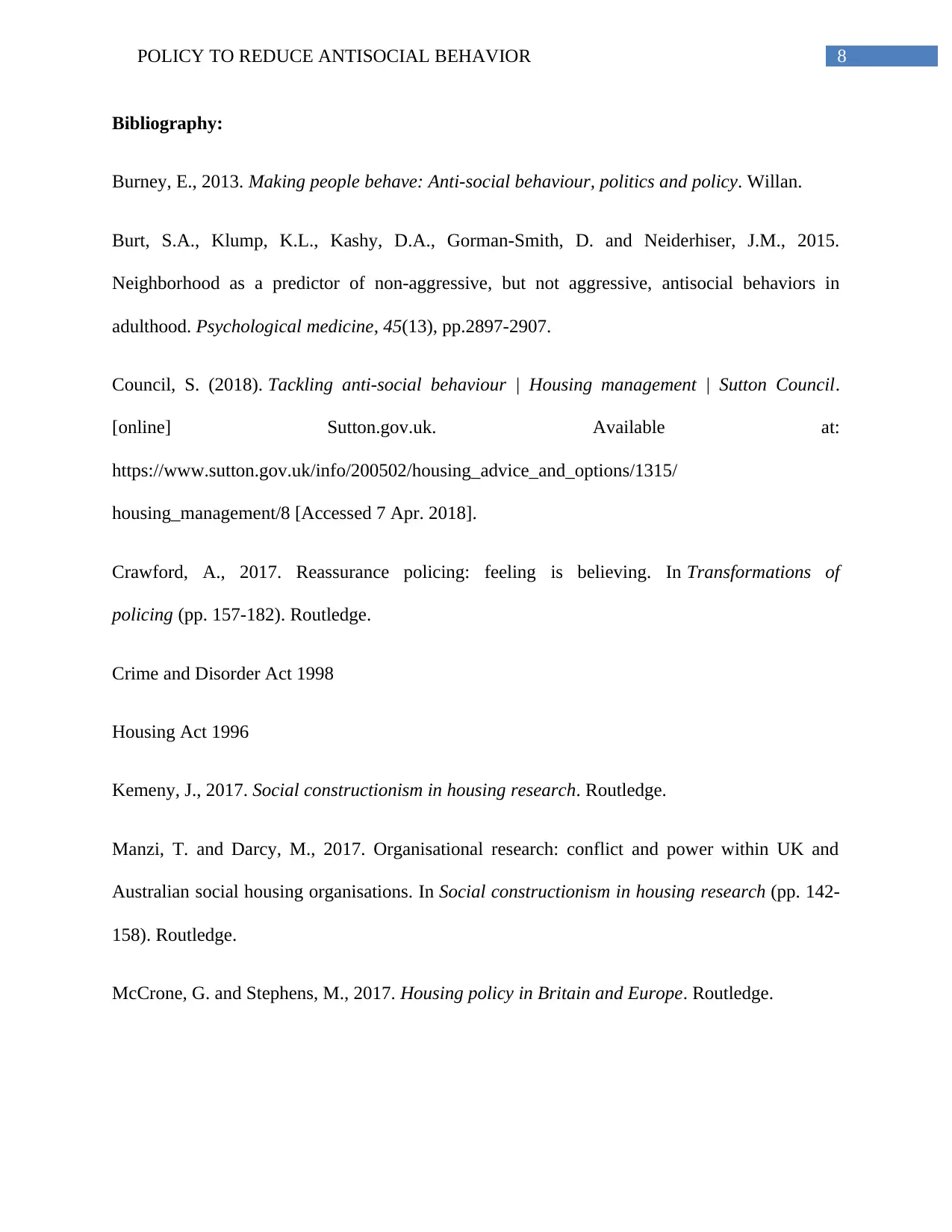
8POLICY TO REDUCE ANTISOCIAL BEHAVIOR
Bibliography:
Burney, E., 2013. Making people behave: Anti-social behaviour, politics and policy. Willan.
Burt, S.A., Klump, K.L., Kashy, D.A., Gorman-Smith, D. and Neiderhiser, J.M., 2015.
Neighborhood as a predictor of non-aggressive, but not aggressive, antisocial behaviors in
adulthood. Psychological medicine, 45(13), pp.2897-2907.
Council, S. (2018). Tackling anti-social behaviour | Housing management | Sutton Council.
[online] Sutton.gov.uk. Available at:
https://www.sutton.gov.uk/info/200502/housing_advice_and_options/1315/
housing_management/8 [Accessed 7 Apr. 2018].
Crawford, A., 2017. Reassurance policing: feeling is believing. In Transformations of
policing (pp. 157-182). Routledge.
Crime and Disorder Act 1998
Housing Act 1996
Kemeny, J., 2017. Social constructionism in housing research. Routledge.
Manzi, T. and Darcy, M., 2017. Organisational research: conflict and power within UK and
Australian social housing organisations. In Social constructionism in housing research (pp. 142-
158). Routledge.
McCrone, G. and Stephens, M., 2017. Housing policy in Britain and Europe. Routledge.
Bibliography:
Burney, E., 2013. Making people behave: Anti-social behaviour, politics and policy. Willan.
Burt, S.A., Klump, K.L., Kashy, D.A., Gorman-Smith, D. and Neiderhiser, J.M., 2015.
Neighborhood as a predictor of non-aggressive, but not aggressive, antisocial behaviors in
adulthood. Psychological medicine, 45(13), pp.2897-2907.
Council, S. (2018). Tackling anti-social behaviour | Housing management | Sutton Council.
[online] Sutton.gov.uk. Available at:
https://www.sutton.gov.uk/info/200502/housing_advice_and_options/1315/
housing_management/8 [Accessed 7 Apr. 2018].
Crawford, A., 2017. Reassurance policing: feeling is believing. In Transformations of
policing (pp. 157-182). Routledge.
Crime and Disorder Act 1998
Housing Act 1996
Kemeny, J., 2017. Social constructionism in housing research. Routledge.
Manzi, T. and Darcy, M., 2017. Organisational research: conflict and power within UK and
Australian social housing organisations. In Social constructionism in housing research (pp. 142-
158). Routledge.
McCrone, G. and Stephens, M., 2017. Housing policy in Britain and Europe. Routledge.
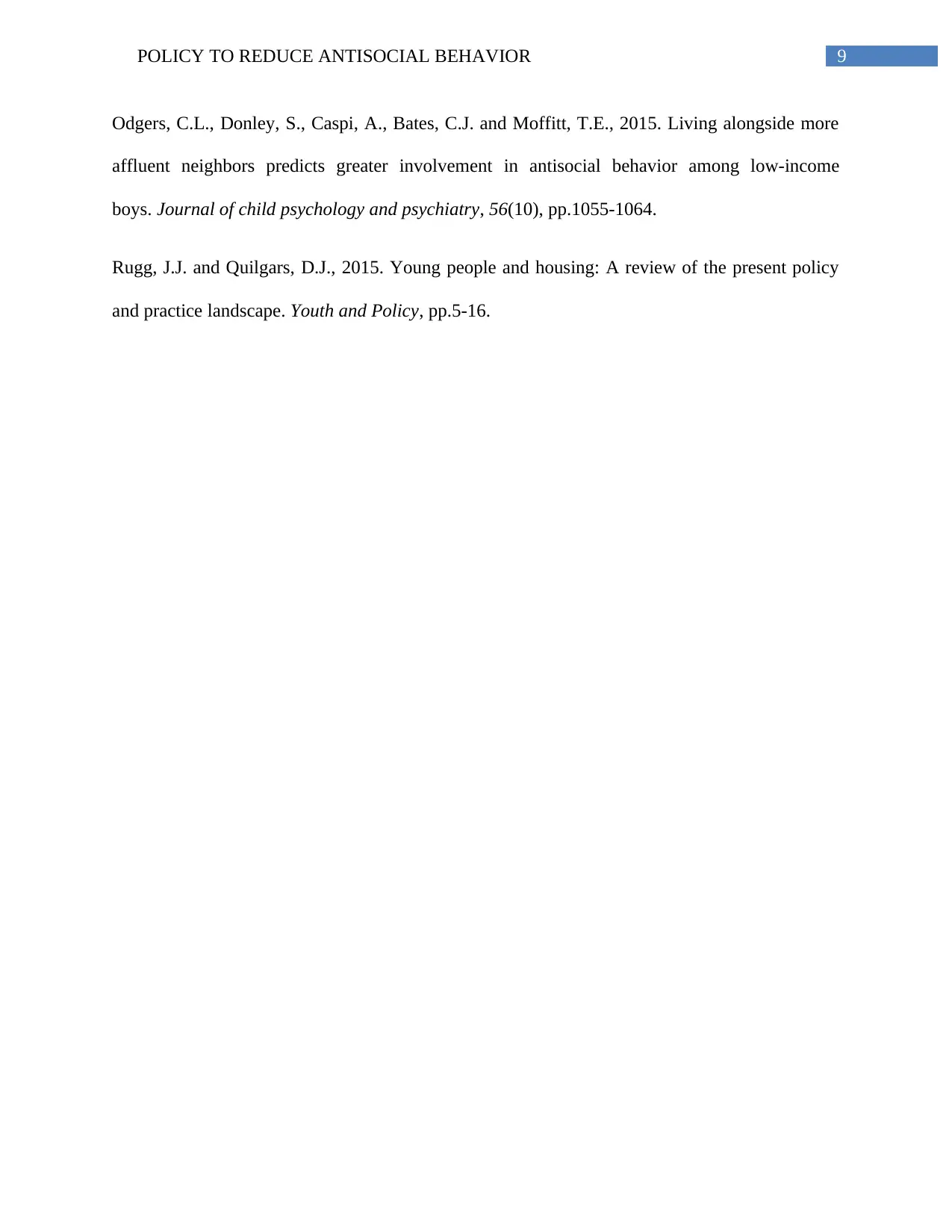
9POLICY TO REDUCE ANTISOCIAL BEHAVIOR
Odgers, C.L., Donley, S., Caspi, A., Bates, C.J. and Moffitt, T.E., 2015. Living alongside more
affluent neighbors predicts greater involvement in antisocial behavior among low‐income
boys. Journal of child psychology and psychiatry, 56(10), pp.1055-1064.
Rugg, J.J. and Quilgars, D.J., 2015. Young people and housing: A review of the present policy
and practice landscape. Youth and Policy, pp.5-16.
Odgers, C.L., Donley, S., Caspi, A., Bates, C.J. and Moffitt, T.E., 2015. Living alongside more
affluent neighbors predicts greater involvement in antisocial behavior among low‐income
boys. Journal of child psychology and psychiatry, 56(10), pp.1055-1064.
Rugg, J.J. and Quilgars, D.J., 2015. Young people and housing: A review of the present policy
and practice landscape. Youth and Policy, pp.5-16.
1 out of 10
Your All-in-One AI-Powered Toolkit for Academic Success.
+13062052269
info@desklib.com
Available 24*7 on WhatsApp / Email
![[object Object]](/_next/static/media/star-bottom.7253800d.svg)
Unlock your academic potential
© 2024 | Zucol Services PVT LTD | All rights reserved.

